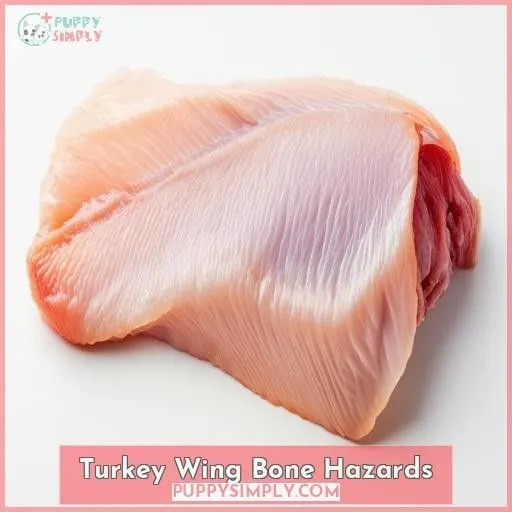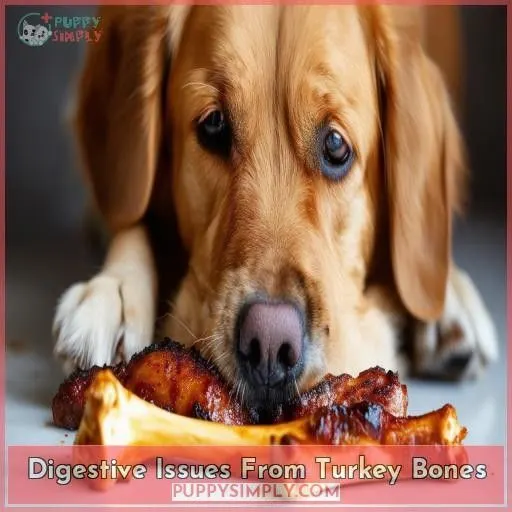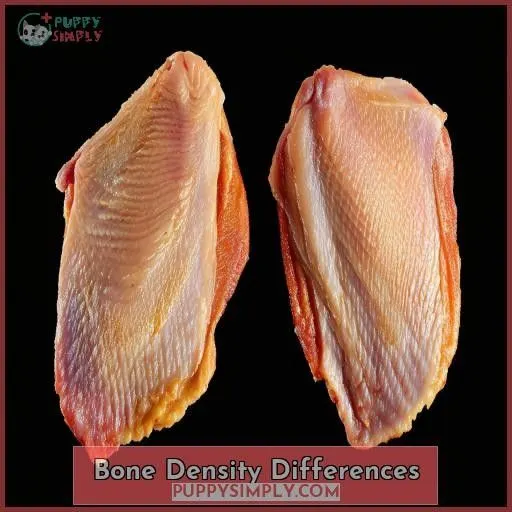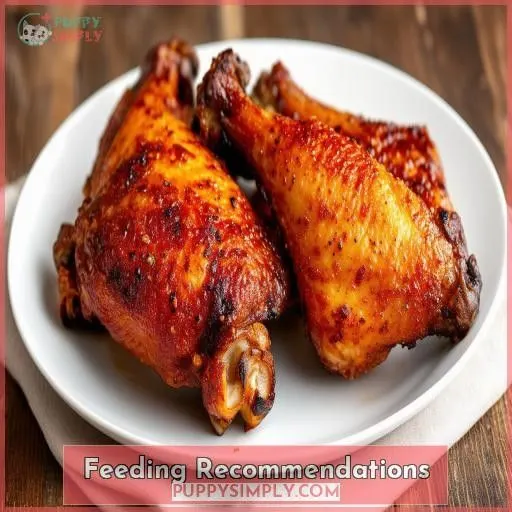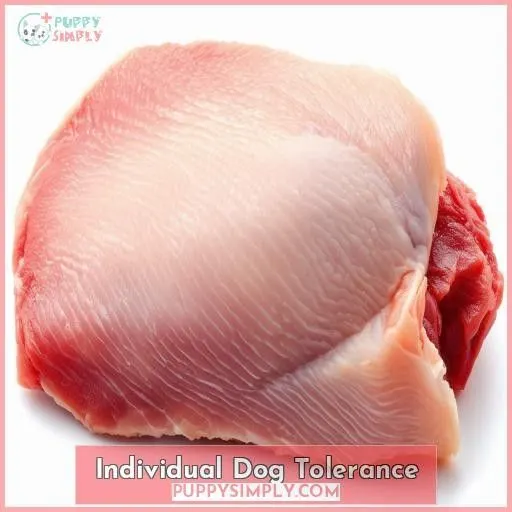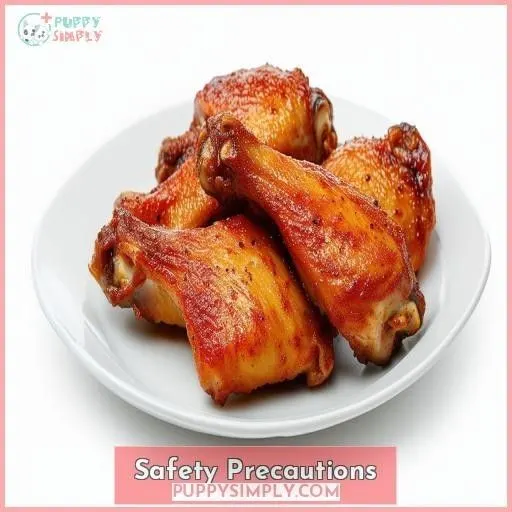This site is supported by our readers. We may earn a commission, at no cost to you, if you purchase through links.
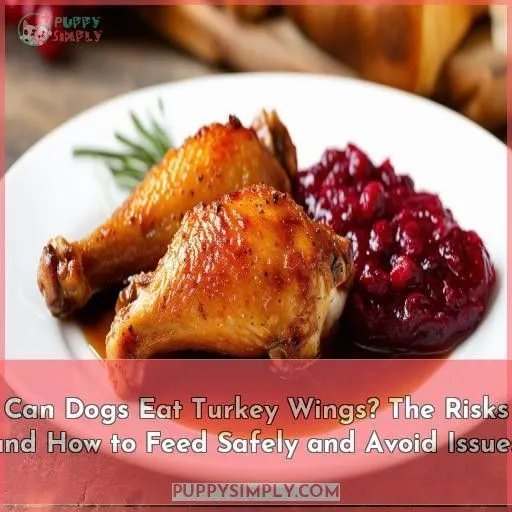 You should avoid feeding your dog turkey wings due to the dense bones that can splinter and cause serious digestive issues.
You should avoid feeding your dog turkey wings due to the dense bones that can splinter and cause serious digestive issues.
If your pup does ingest turkey wing bones, watch for symptoms like bloody stools, vomiting, lack of appetite, and straining to defecate. These signs indicate the bones may have punctured the intestines – a life-threatening emergency.
To safely offer turkey, opt for boneless cuts like the breast or thighs. Properly prepare the meat by removing fat, skin, and seasoning to prevent digestive upset.
With precautions, turkey can provide valuable nutrients, but it’s best to explore further guidance on incorporating it safely into your dog’s diet.
Table Of Contents
Key Takeaways
- Gobble gobble, beware of that turkey wobble! Those dense wing bones can splinter and shred your pup’s insides, leading to a real gut-wrenching situation. Who wants to clean up that mess?
- Yeah, you could roll the dice and hope Fido handles those bones like a champ. But do you really want to play Russian roulette with your furry friend’s digestive tract? Safer to stick to boneless cuts and avoid that potential trip to the vet’s office.
- Look, I get it – dogs have been chowing down on turkey bones for ages. But with all the healthier alternatives out there nowadays, is it really worth risking an obstructed intestine or nasty puncture wound? Let’s show some love for that cute doggo tummy.
- At the end of the day, a little preparation goes a long way. Strip off that skin and fat, nix the seasoning, and you’ve got a lean, mean, nutrient-packed protein for your pup to enjoy. Just keep those pesky bones far, far away!
Can Dogs Eat Turkey Wings?
No, dogs shouldn’t eat turkey wings. The bones in turkey wings can splinter and cause intestinal blockages or lacerations, leading to potentially serious health issues for dogs.
Turkey Wing Bone Hazards
Turkey wings pose a serious splintering hazard due to their dense bones.
These bones can break into sharp shards, potentially causing digestive problems if swallowed.
Cooking makes turkey bones even more brittle and prone to shattering.
Seasoned or marinated wings are also risky since seasonings can further irritate your pup’s digestive tract.
While some dogs handle turkey wings without issue, it’s wise to exercise caution – bone splinters are no fun for anyone involved.
Consider safer protein sources or remove all bones before serving turkey to your furry friend.
Digestive Issues From Turkey Bones
If your dog consumes turkey bones, be on the lookout for symptoms like dark brown, slimy poop possibly containing blood, as this could indicate digestive issues from bone splinters irritating the intestinal tract. Vomiting up bone fragments, hunger puking, and a lack of appetite may also occur if the bones aren’t being properly digested.
Symptoms of Bone Digestion Problems
If your dog consumes turkey bones, watch for these signs of digestive issues: 1) Dark brown, slimy poop with blood 2) Vomiting bone fragments, often in the morning 3) Hunger puking after eating bones 4) Straining to defecate. These symptoms indicate the bones aren’t fully digesting, irritating your pup’s intestines.
Potential Complications
Consuming turkey bones can lead to dangerous complications for your furry friend.
Bone splinters could puncture their esophagus or intestines, causing severe damage.
Shard ingestion often results in digestive upset like vomiting and diarrhea.
With older dogs, bones pose an increased risk due to potential teeth and jaw issues.
To guarantee your pup’s safety, opt for raw or sliced turkey deli meat instead of bones.
Bone Density Differences
Turkey bones, particularly wings and drumsticks, are denser and more prone to splintering compared to chicken bones. You’ll want to exercise extra caution when feeding raw turkey bones, as cooked bones tend to be even more brittle and likely to shatter into sharp fragments.
Turkey Vs. Chicken Bones
When comparing bone density, turkey bones are denser than chicken bones, posing a higher risk of splintering and digestive issues. However, age and toughness also play a role:
- Turkey drumsticks and wings are more dense than necks.
- Older birds have tougher, more problematic bones.
- Cooked bones are harder and splinter more easily.
- Raw bones are generally safer for healthy adult dogs.
Knowing these differences can help you make informed decisions about what poultry bones to feed your pup.
Raw Vs. Cooked Bones
In addition to the density differences between turkey and chicken bones, you’ll also want to account for the state of the bones – raw or cooked. Raw bones are generally softer and more digestible for dogs, while cooked bones become dry and brittle, increasing the risk of splintering.
| Raw Bones | Cooked Bones |
|---|---|
| Softer texture | Harder, more brittle |
| Easier to digest | Increased splintering risk |
| Lower density | Higher density |
| Safer option | Pose more hazards |
While some dogs may handle cooked turkey bones without issue, it’s generally safer to stick with raw, meaty bones or opt for other chew alternatives to avoid potential digestive problems.
Feeding Recommendations
If you decide to feed your dog turkey, opt for safer parts like turkey necks or legs, as they pose a lower risk of splintering or causing digestive issues. When preparing turkey for your pup, thoroughly remove all bones, fat, and skin to minimize potential hazards.
Safer Turkey Parts
You’re better off avoiding turkey wings altogether and instead providing safer options like turkey necks or drumsticks. Turkey necks offer a good dental workout without the dense bones that can splinter. Smaller turkey drumsticks from budget stores are also a solid choice for most dogs to consume safely.
Meal Preparation Tips
You’ll want to thoroughly rinse the boiled turkey meat to remove any excess fat or seasoning. For an added safety measure, carefully remove the skin and any small bones you notice. Some owners choose to lightly roast or simmer the meat after boiling to enhance flavor without drying it out.
Individual Dog Tolerance
If you’re changing your dog to a raw food diet, monitor their ability to digest turkey bones closely. Some dogs can handle turkey bones better than others, so observe for any signs of digestive distress and adjust accordingly.
Transitioning to Raw Diet
You may want to explore switching your dog to a raw diet. Raw food can:
- Support proper digestive enzyme production
- Improve bone and meat digestion
- Provide long-term gut health benefits
However, the change should be gradual. If your dog is a puppy, consult your vet first, as their needs differ.
Monitoring for Issues
Closely observe your pup after introducing turkey wings. Watch for bone splinters in vomit or stool – a telltale sign of digestive issues. Hunger puking, discomfort, or bloody stools? Stop feeding wings immediately and consult your vet to avoid esophageal punctures or intestinal irritation.
| Symptom | Risk | Action |
|---|---|---|
| Vomiting Bones | Esophageal Puncture | Stop Feeding, Vet Visit |
| Bloody Stool | Intestinal Irritation | Discontinue, Monitoring |
| Hunger Puking | Incomplete Digestion | Switch Proteins |
Safety Precautions
When introducing turkey wings to your dog’s diet, it’s imperative to closely supervise them during mealtimes. Immediately seek veterinary attention if any concerning symptoms arise, such as vomiting, diarrhea, or signs of discomfort.
While some dogs may tolerate turkey bones without issues, it’s better to err on the side of caution. Take preventative measures to avoid potential digestive complications.
Supervision During Meals
You should closely monitor your dog when feeding turkey wings. Follow these precautions:
- Supervise the entire meal process
- Limit feeding frequency to avoid overindulgence
- Time meals for ideal dental health
- Consider the nutritional value and balance
Bone handling requires caution to prevent accidents or digestive issues. Stay vigilant to guarantee a safe, enriching experience.
Seeking Veterinary Care
Don’t hesitate to consult your vet if you notice concerning symptoms like lethargy, vomiting, or abnormal stools after feeding turkey bones. While minor issues may resolve with home remedies, it’s essential to seek professional guidance in emergency situations. Your vet can interpret symptoms, recommend alternative feeding options, and guarantee your pup’s well-being.
Frequently Asked Questions (FAQs)
Can dogs eat cooked turkey wings?
Yes, dogs can eat cooked turkey wings, but you should remove the bones first. The dense turkey bones can splinter and cause digestive issues or obstruction if swallowed.
Is turkey safe for dogs to eat?
Sure, dogs can enjoy turkey meat! Just remove bones, skin, and excess fat. Turkey is a lean protein packed with nutrients like zinc and vitamin B Moderation is key for easy digestion. Don’t let them gobble up too much all at once!
What happens if my dog eats a turkey bone?
Turkey bones can splinter and seriously injure your dog’s mouth, throat, or intestines. If your pup eats one, watch closely for signs of discomfort or abnormal stools and contact your vet immediately if anything seems off.
Is it safe to eat turkey wings?
Picture your pup gnawing on that turkey wing bone – shards splintering off, potentially causing internal injuries. It’s best to avoid feeding those dense, cooked bones to keep your furry friend safe and pain-free.
Can puppies eat turkey wings?
No, you shouldn’t feed puppies turkey wings. The bones can splinter and cause serious digestive issues or blockages that may require surgery. It’s best to wait until your pup is fully grown before considering any cooked bones.
How much turkey is safe?
As little as 10% of a turkey wing can splinter and cause digestive issues in dogs. Feed portions no larger than 1/2 cup of turkey meat per 20 lbs body weight for maximum safety.
What if dog swallows bone?
If your dog swallows a turkey bone, don’t panic – monitor for signs of discomfort like vomiting or constipation. If symptoms persist, contact your vet immediately as bone shards can cause serious internal damage. Prevention is key, so supervise closely during meals.
Can bones cause intestinal blockage?
Bone bits becoming blockages? Bitterly beware! Bones can certainly cause concerning clogs, clogging canine innards catastrophically. Carefully consider cutting cooked carcasses cautiously.
Are smoked turkey wings okay?
No, smoked turkey wings aren’t a good idea for dogs. The smoking process dries out and hardens the bones, increasing the risk of splintering and causing an obstructed or punctured digestive tract. It’s best to avoid smoked turkey bones altogether.
Conclusion
Ready to let your pup enjoy turkey wings safely? While these bones pose real risks, you can avoid issues by offering boneless cuts and monitoring closely.
With proper preparation and precautions, turkey can be a nutrient-rich treat for dogs. Stay vigilant for concerning symptoms, and don’t hesitate to consult your vet for personalized guidance on incorporating turkey into Fido’s diet responsibly.

